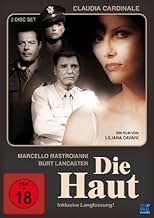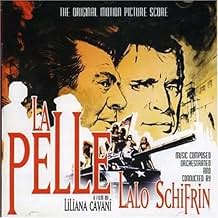PUNTUACIÓN EN IMDb
6,6/10
1,4 mil
TU PUNTUACIÓN
Añade un argumento en tu idiomaAfter the Allies liberate Naples in 1943, the life for the locals is not much easier, especially for women. Many sacrifice their dignity and morale to survive.After the Allies liberate Naples in 1943, the life for the locals is not much easier, especially for women. Many sacrifice their dignity and morale to survive.After the Allies liberate Naples in 1943, the life for the locals is not much easier, especially for women. Many sacrifice their dignity and morale to survive.
- Premios
- 1 premio y 2 nominaciones en total
Peppe Barra
- Sarto
- (as Giuseppe Barra)
Rosaria della Femmina
- Amante di Jimmy
- (as Maria Rosaria Della Femmina)
Argumento
¿Sabías que...?
- CuriosidadesThe film's editor was Ruggero Mastroianni, Marcello Mastroianni's brother.
- PifiasAt approximately 19 mn into the movie and again at approximately 1h18 mn, Goldberg, the roommate of Jimmy Wren (Ken Marshall), is seen reading an issue of the comic book "Batman". However the cover is clearly shown and is in fact that of issue N°257, published in August 1974, ie 31 years after the events of the movie.
- ConexionesFeatured in Naples '44 (2016)
- Banda sonoraLa Pelle
written by Roberto De Simone
sung by Maria Kelly
recorded on "La Gatta Cenerentola"
published by La voce del padrone; EMI Italiana
Reseña destacada
This movie is based on the true memoirs of the main character (Curzio Malaparte) during his time when he acted as diplomatic liaison between the Allied forces and the Italian in the newly occupied Italy. The book is a collection of short stories depicting the collapse of the Italian society under Allied occupation. There is no story line between those short stories. The movie puts them in chronological order, but the reigning chaos and lack of moral message (the message is exactly the lack of morality) can confuse the spectator.
This is a very original war movie, in that the main theme is the not the war front. The Allied are not viewed from their own perspective, which is one of true liberators. Instead, the movie shows the Italian people courting the Allies as liberators in order to escape from starvation. The Allies themselves are caught in a trap where they know the Italian hospitality isn't sincere, but are unable to understand why. They don't realize that before them, the Germans were courted as liberators too, and that in this context of food shortage and general poverty, the only way the Italians have to secure their survival is to play that game.
Malaparte (played by Marcello Mastroiani) acts then as a translator, helping the Americans as a guide would help a tourist, by explaining in each situation why people are acting in this seemingly dishonorable way.
La Pelle (The Skin) would make more sense if compared to Malaparte's twin book on the occupied Europe (Kaputt, or Broken to Pieces). In the latter, he portrays the Nazi way of oppressing through violence. In La Pelle, he shows how the Americans achieve a similar result through economic means, while refusing any responsibility. In Kaputt, Jewish women are made prostitutes by the German Army to escape death by the bullet; in La Pelle, Italian women become prostitutes for the American Army to escape death by starvation.
This is a very original war movie, in that the main theme is the not the war front. The Allied are not viewed from their own perspective, which is one of true liberators. Instead, the movie shows the Italian people courting the Allies as liberators in order to escape from starvation. The Allies themselves are caught in a trap where they know the Italian hospitality isn't sincere, but are unable to understand why. They don't realize that before them, the Germans were courted as liberators too, and that in this context of food shortage and general poverty, the only way the Italians have to secure their survival is to play that game.
Malaparte (played by Marcello Mastroiani) acts then as a translator, helping the Americans as a guide would help a tourist, by explaining in each situation why people are acting in this seemingly dishonorable way.
La Pelle (The Skin) would make more sense if compared to Malaparte's twin book on the occupied Europe (Kaputt, or Broken to Pieces). In the latter, he portrays the Nazi way of oppressing through violence. In La Pelle, he shows how the Americans achieve a similar result through economic means, while refusing any responsibility. In Kaputt, Jewish women are made prostitutes by the German Army to escape death by the bullet; in La Pelle, Italian women become prostitutes for the American Army to escape death by starvation.
- dmvianna
- 17 nov 2007
- Enlace permanente
Selecciones populares
Inicia sesión para calificar y añadir a tu lista para recibir recomendaciones personalizadas
- How long is The Skin?Con tecnología de Alexa
Detalles
- Fecha de lanzamiento
- Países de origen
- Sitio oficial
- Idioma
- Títulos en diferentes países
- La pell
- Localizaciones del rodaje
- Casa Malaparte, Isle of Capri, Nápoles, Campania, Italia(Villa of the main character, Curzio Malaparte)
- Empresas productoras
- Ver más compañías en los créditos en IMDbPro
- Duración2 horas 11 minutos
- Mezcla de sonido
Contribuir a esta página
Sugerir un cambio o añadir el contenido que falta

Principal laguna de datos
By what name was La piel (1981) officially released in India in English?
Responde




























